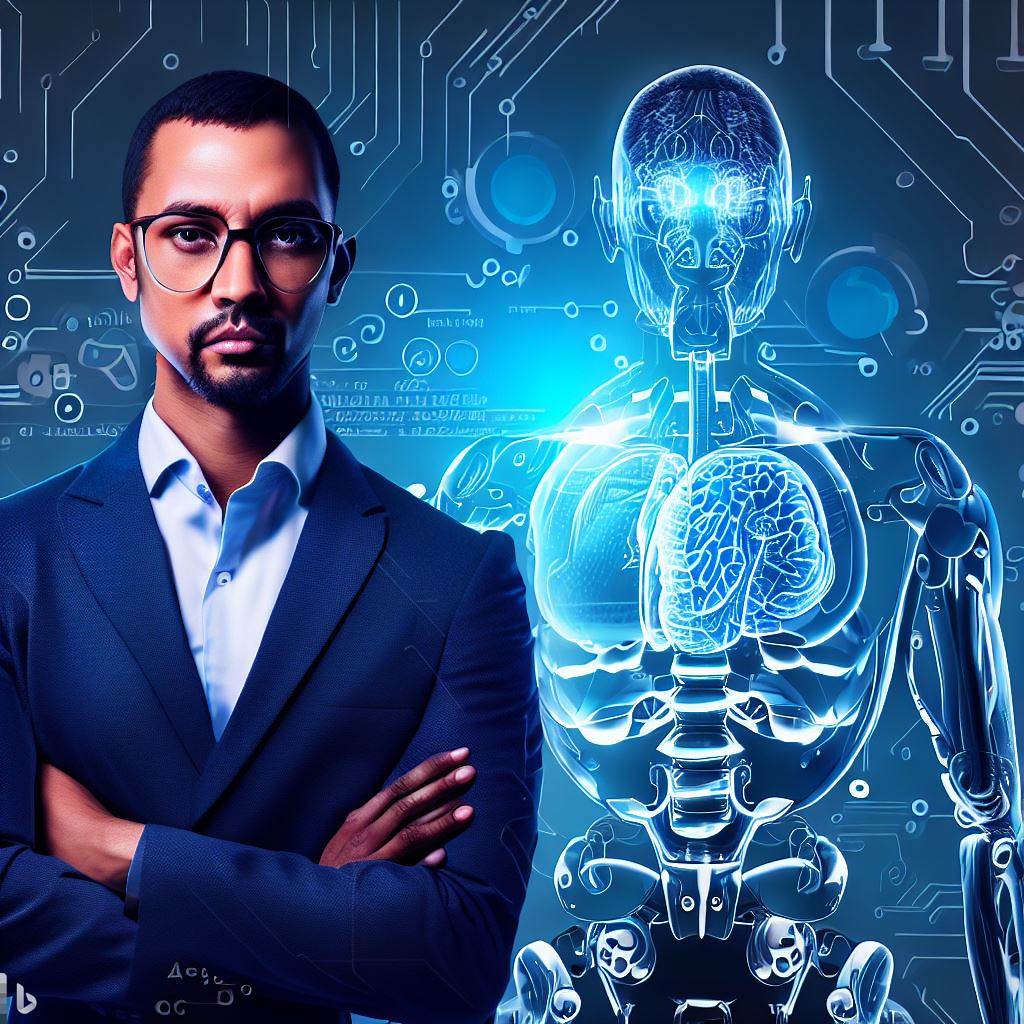Introduction
The intersection of AI and biomedical engineering in Nigeria holds great significance in advancing healthcare and medical technology in the country.
By combining artificial intelligence and biomedical engineering, Nigeria can revolutionize its healthcare sector and improve patient outcomes.
AI has the potential to transform medical diagnosis and treatment by analyzing large amounts of patient data.
With the use of machine learning algorithms, AI can identify patterns and make accurate predictions, aiding in early detection and personalized treatment planning.
This intersection can lead to the development of smart healthcare systems that can monitor patients remotely and provide real-time feedback.
Biomedical engineering complements AI by designing and developing medical devices and technology.
By integrating AI into these devices, healthcare professionals can make more informed decisions, leading to improved patient care.
For example, AI-powered prosthetics can enhance the mobility and independence of individuals with disabilities.
Moreover, the emergence of AI-driven wearable devices can monitor vital signs, detect abnormalities, and alert healthcare providers in real-time.
This can significantly improve the timeliness and efficiency of healthcare delivery in Nigeria, especially in remote or resource-constrained areas.
The intersection of AI and biomedical engineering also opens avenues for innovative research and development.
Nigerian scientists and engineers can collaborate to create homegrown solutions for the country’s healthcare challenges.
This can lead to economic growth, job creation, and increased healthcare accessibility for all Nigerians.
Most importantly, the intersection of AI and biomedical engineering in Nigeria has immense potential for advancing healthcare and medical technology.
By harnessing the power of AI and leveraging biomedical engineering skills, Nigeria can improve patient care, enhance healthcare infrastructure, and foster innovation in the field of healthcare.
Overview of AI in Healthcare
Explain the concept of AI and its applications in the healthcare industry.
Artificial Intelligence (AI) refers to the ability of machines to simulate human intelligence.
In the healthcare industry, AI is revolutionizing the way healthcare providers diagnose, treat, and manage patient care.
AI applications in healthcare include:
- Medical Imaging: AI algorithms can analyze medical images like X-rays, CT scans, and MRIs to detect abnormalities with high accuracy, aiding in early disease detection.
- Healthcare Robotics: AI-powered robots can assist in surgeries, rehabilitation, and support tasks, enhancing precision and reducing the risk of errors.
- Electronic Health Records (EHR): AI can organize and analyze patient data, improving patient care by providing real-time insights to healthcare providers.
- Virtual Assistants: AI-powered virtual assistants like chatbots can provide personalized medical advice, schedule appointments, and answer patients’ queries.
- Predictive Analytics: AI algorithms can analyze patient data to predict disease progression, identify high-risk patients, and recommend personalized treatment plans.
Discuss the various ways AI is being used globally to improve patient care, diagnostics, and research.
AI has immense potential to transform healthcare globally. Some of the key ways AI is improving patient care, diagnostics, and research include:
- Enhanced Diagnostics: AI algorithms can analyze vast amounts of medical data, aiding in early and accurate diagnosis, thereby improving patient outcomes.
- Precision Medicine: AI can analyze genomic data to identify personalized treatment options and predict a patient’s response to specific treatments.
- Drug Discovery: AI accelerates the drug discovery process by analyzing vast databases, identifying potential drug targets, and designing new molecules.
- Remote Patient Monitoring: AI-powered wearable devices can continuously monitor vital signs, alerting healthcare providers to any significant changes in a patient’s health.
- Data Analytics: AI can analyze large datasets to identify patterns, predict disease outbreaks, and improve population health management.
- Telemedicine: AI-powered chatbots and virtual doctors enable patients to access medical advice remotely, increasing healthcare accessibility.
In Nigeria, the intersection of AI and biomedical engineering holds promising prospects for advancing healthcare.
With a strong emphasis on technological innovation, Nigeria has the potential to leverage AI in medical imaging, telemedicine, and disease surveillance.
However, challenges such as limited infrastructure, lack of data privacy regulations, and the digital divide need to be addressed for the widespread adoption of AI in healthcare in Nigeria.
In fact, AI has the potential to revolutionize healthcare in Nigeria and globally.
From improving diagnostics to facilitating remote patient monitoring, AI offers exciting opportunities for better patient outcomes and enhanced healthcare delivery.
Read: Universities Offering Robotics Engineering in Nigeria
Biomedical Engineering in Nigeria
Biomedical engineering is a rapidly growing field in Nigeria, combining principles of engineering and medicine to improve healthcare.
With the intersection of AI, the field is experiencing remarkable advancements and opportunities.
Background Information on Biomedical Engineering in Nigeria
- Biomedical engineering focuses on developing and applying technological solutions to healthcare challenges.
- In Nigeria, the field addresses healthcare problems by utilizing engineering principles and medical knowledge.
- It involves the design, development, and maintenance of medical devices, equipment, and systems.
- Biomedical engineers in Nigeria work closely with healthcare professionals to enhance patient care and treatment outcomes.
Challenges and Opportunities Faced by Biomedical Engineers in the Country
While biomedical engineering in Nigeria offers immense potential, it also faces certain challenges:
- Lack of infrastructure and investment restricts research and development in the field.
- Funding for biomedical engineering projects is often limited, hindering progress and innovation.
- The limited availability of skilled professionals and experts poses challenges for the field.
- Regulatory frameworks for biomedical engineering need to be established and enforced effectively.
Despite these challenges, there are significant opportunities for biomedical engineers in Nigeria:
The growing demand for healthcare services creates a need for technological interventions.
Advancements in AI and data analytics provide new possibilities for personalized medicine.
Collaboration with international organizations and institutions opens doors for knowledge exchange and skill development.
Advancements in Biomedical Engineering Research and Development in Nigeria
Nigeria has made remarkable progress in the field of biomedical engineering, particularly in research and development:
- The development of low-cost medical devices and equipment to meet the demands of the population.
- Research into telemedicine and remote healthcare delivery, improving access to healthcare services in remote areas.
- The use of AI algorithms for disease diagnosis, predicting treatment outcomes, and drug development.
- Biomechanics research to enhance prosthetic limbs and improve rehabilitation outcomes.
- Integration of AI and machine learning techniques to analyze medical data and improve patient care.
These advancements highlight the growing capabilities of biomedical engineers in Nigeria and their contributions to healthcare.
By leveraging AI and technology, biomedical engineering in Nigeria has the potential to revolutionize healthcare delivery in the country.
In the end, biomedical engineering in Nigeria holds great promise in addressing healthcare challenges.
While there are obstacles to overcome, the field presents significant opportunities for growth and innovation.
With advancements in AI and research and development, biomedical engineers are at the forefront of transforming healthcare in the country.
AI Applications in Biomedical Engineering
The Intersection of AI and Biomedical Engineering in Nigeria holds transformative potential. AI is reshaping healthcare in diverse ways.
Notably, AI’s integration with medical imaging enhances diagnostics and treatment.
It adeptly analyzes images, spotting nuances eluding human observation, thus refining diagnoses and treatment strategies.
AI extends its influence to prosthetic innovation.
Employing machine learning, engineers craft intelligent prosthetics mirroring human motion, markedly enhancing the lives of limb-deficient individuals.
AI proves invaluable in handling vast biomedical data, often overwhelming for humans.
Here, AI excels, extracting insightful patterns, catalyzing research, and enriching patient outcomes.
AI’s foresight extends to disease outbreak prediction, aiding resource allocation. Despite challenges like limited resources, Nigerian experts make remarkable AI-driven healthcare strides.
AI-enabled medical imaging elevates diagnostic precision, while startups devise patient-tailored AI prosthetics.
Collaborations yield extensive medical databases and AI algorithms, potentially uncovering epidemiological insights.
AI-driven healthcare management optimizes Nigeria’s resource allocation and health planning, strengthening its healthcare landscape. Ethical AI use is imperative, ensuring privacy compliance.
In summation, Nigeria’s AI-Biomedical Engineering crossroads is a beacon of potential.
AI’s role spans imaging to prosthetics, profoundly advancing diagnostics, treatment, and research, with continued investment promising transformative outcomes.
Read: Ethics in Biomedical Engineering: A Nigerian Perspective

Current Scenario in Nigeria
Nigeria’s biomedical engineering sector shows promise in adopting artificial intelligence (AI), yet hurdles impede seamless integration.
While global healthcare embraces AI, Nigeria faces specific challenges. AI’s entry into Nigerian biomedical engineering remains nascent.
AI aids diagnosis, medical imaging, and predictive analytics, but its full healthcare potential is untapped.
Nigerian biomedical engineers grapple with multiple obstacles. Limited AI awareness among healthcare professionals obstructs its fusion.
Convincing stakeholders about AI’s healthcare benefits is a hurdle.
Insufficient infrastructure and resources are major roadblocks. Scarce access to high-performance computing and data storage curtails AI algorithm efficacy.
Acquiring pertinent data for AI training is also problematic.
Despite these, strides emerge. The African Biomedical Engineering Consortium (ABEC) acts as a bridge between AI research and Nigerian clinical practice, offering biomedical engineers AI training.
A Nigerian startup’s AI-powered app detects skin cancer early.
It evaluates skin lesion images, providing swift feedback for potential life-saving diagnoses.
Collaborations with global entities enhance AI’s healthcare integration.
Knowledge transfer, joint research, and capacity building alleviate Nigerian biomedical engineers’ challenges.
In summation, Nigeria’s AI adoption in biomedical engineering is promising yet hindered.
Challenges persist, but initiatives, including partnerships, and success stories, signify AI’s potential in revolutionizing Nigerian healthcare.
Read: Pioneers of Biomedical Engineering in Nigeria: A Spotlight
Delve into the Subject: Examining the Gender Gap in Nigeria’s Agri Engineering
Potential Impact on Healthcare in Nigeria
Discuss the potential benefits of the intersection of AI and biomedical engineering in Nigeria.
By combining AI and biomedical engineering, Nigeria can benefit from advanced healthcare technologies that can revolutionize patient care.
- Improved diagnosis: AI can help analyze vast amounts of medical data to identify patterns and improve accuracy in diagnosis.
- Enhanced treatment: AI-based systems can assist healthcare professionals in choosing the most effective treatment plans for patients.
- Advanced imaging: Biomedical engineering can develop cutting-edge imaging technologies to aid in the detection and treatment of diseases.
- Personalized medicine: AI techniques can enable customized treatment plans that cater to individual patient needs.
Explore how AI can improve healthcare accessibility, affordability, and efficiency in the country.
The integration of AI and biomedical engineering can address critical healthcare challenges and enhance the healthcare system in Nigeria.
- Remote healthcare: AI can provide telemedicine solutions, allowing patients to consult doctors remotely without physical visits.
- Cost reduction: By automating certain repetitive tasks, AI can reduce healthcare costs and make treatments more affordable for the population.
- Efficient resource allocation: AI algorithms can assist in optimizing resource allocation, ensuring healthcare facilities have the necessary equipment and staff.
- Streamlined operations: AI can improve hospital management systems, reducing waiting times and improving overall healthcare service efficiency.
Highlight the potential impact on disease detection, treatment, and prevention in Nigeria.
The intersection of AI and biomedical engineering holds immense potential in transforming disease management in Nigeria.
- Early disease detection: AI algorithms can analyze medical data to identify early signs of diseases, enabling prompt treatment initiation.
- Improved treatment outcomes: By utilizing AI in treatment decision-making, healthcare providers can enhance treatment effectiveness, leading to better patient outcomes.
- Preventive interventions: AI can assist in identifying high-risk individuals, allowing for targeted preventive interventions and reducing the burden of disease.
- Chronic disease management: AI-driven systems can monitor patients with chronic diseases, providing real-time feedback and improving disease management.
In short, the intersection of AI and biomedical engineering in Nigeria has immense potential to positively impact healthcare.
By leveraging AI technologies, the country can improve healthcare accessibility, affordability, and efficiency. It can also enhance disease detection, treatment, and prevention strategies, ultimately leading to better health outcomes for the Nigerian population.
Read: How Biomedical Engineers Are Transforming Nigerian Hospitals
Current and Future Collaborations
Collaborations between AI experts and biomedical engineers in Nigeria are an essential aspect of driving advancements in healthcare technology.
These partnerships create a synergistic environment where the expertise of both fields can be leveraged to solve complex healthcare challenges.
Existing Collaborations
In Nigeria, there are several ongoing collaborations between AI experts and biomedical engineers.
One notable example is the collaboration between the University of Lagos and the Nigerian Institute of Medical Research.
Together, they have developed an AI-powered diagnostic tool for early detection of infectious diseases.
Another collaboration exists between the Federal University of Technology, Akure, and a team of AI researchers.
They are working on developing AI algorithms to analyze biomedical signals and improve the accuracy of medical diagnosis.
These collaborations demonstrate the power of combining AI and biomedical engineering expertise to create innovative solutions that can significantly impact healthcare in Nigeria.
Importance of Collaborations in Driving Advancements
Collaborations between AI experts and biomedical engineers play a crucial role in driving advancements in healthcare technology.
These partnerships allow for the integration of AI algorithms and techniques into medical devices and systems, enhancing their capabilities.
AI can analyze large amounts of medical data rapidly and accurately, providing valuable insights for personalized patient care.
By collaborating with biomedical engineers, AI experts can understand the unique challenges in the healthcare domain and develop tailored solutions.
Moreover, collaborations facilitate the translation of research findings into practical applications.
Biomedical engineers can contribute their expertise in designing and developing medical devices, ensuring that AI-powered technologies are safe, reliable, and user-friendly.
Potential Areas of Collaboration
There are numerous potential areas of collaboration between AI researchers, biomedical engineers, and healthcare institutions in Nigeria.
- Medical Imaging: AI can analyze medical images to aid in the early detection and diagnosis of diseases. Collaborations can focus on developing AI algorithms to improve the accuracy and speed of medical image analysis.
- Telemedicine: AI can play a vital role in telemedicine by automating the analysis of patient data and providing remote healthcare support. Collaborative efforts can develop AI systems that can handle patient inquiries, recommend treatment plans, and monitor patient progress.
- Health Records and Data Management: Collaborations can focus on utilizing AI to streamline health record management, enabling efficient data storage, retrieval, and analysis. AI-powered systems can help healthcare institutions make data-driven decisions for improved patient care.
- Medical Robotics: AI and biomedical engineering collaborations can lead to the development of robotic systems for surgical procedures, rehabilitation, and caregiving. AI can enhance the precision and safety of robot-assisted interventions.
Overall, collaborations between AI researchers, biomedical engineers, and healthcare institutions in Nigeria have the potential to revolutionize healthcare technology, resulting in improved patient outcomes and more accessible healthcare services.
Read: A Comprehensive Review of Biomedical Engineering Laws in Nigeria
Conclusion
The intersection of AI and biomedical engineering in Nigeria holds immense potential for transforming healthcare.
Through this collaboration, AI can revolutionize medical diagnostics, treatment planning, and patient care.
By leveraging AI algorithms and machine learning, healthcare professionals can make more accurate and timely diagnoses, leading to improved patient outcomes.
Additionally, AI can assist in optimizing healthcare processes and resource allocation, ensuring efficient and cost-effective healthcare delivery.
Furthermore, investing in research and development, collaboration, and technological infrastructure to support this intersection is crucial for the betterment of healthcare in Nigeria.
By fostering partnerships between universities, research institutions, and healthcare providers, innovative solutions can be developed and implemented to address the unique challenges faced by the Nigerian healthcare system.
It is essential for policymakers, healthcare professionals, and investors to recognize the potential of AI in biomedical engineering and allocate resources accordingly.
By supporting initiatives that promote the integration of AI into healthcare systems, Nigeria can significantly enhance its healthcare outcomes, improve patient experiences, and reduce healthcare costs.
All in all, the intersection of AI and biomedical engineering has the power to revolutionize healthcare in Nigeria.
With further research, collaboration, and investment, Nigeria can lead the way in leveraging AI technologies for the betterment of its healthcare system and the well-being of its population.
The journey towards a technologically advanced healthcare system starts now. Let us embrace this opportunity and work together to shape the future of healthcare in Nigeria.




